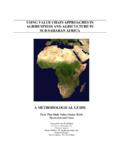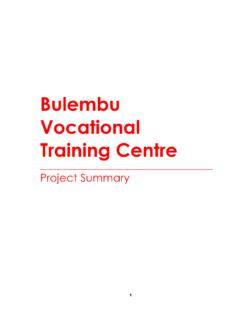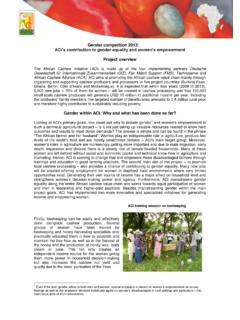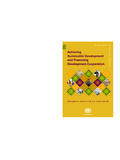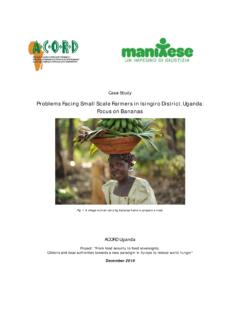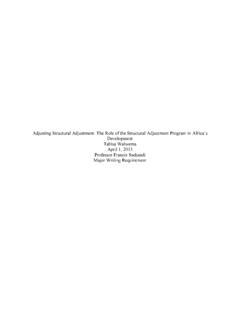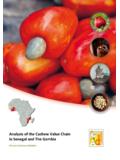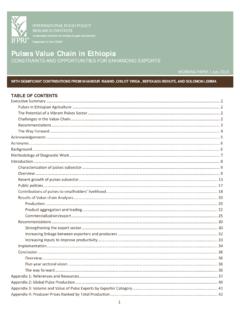Transcription of Building Competitiveness in Africa’s Agriculture
1 A G R I C U LT U R E A N D R U R A L D E V E L O P M E N T. Building Competitiveness in africa 's Agriculture A GUIDE TO VALUE CHAIN CONCEPTS AND APPLICATIONS. C. Martin Webber and Patrick Labaste Building Competitiveness in africa 's Agriculture A G R I C U LT U R E A N D R U R A L D E V E L O P M E N T. Seventy-five percent of the world's poor live in rural areas and most are involved in Agriculture . In the 21st century, Agriculture remains fundamental to economic growth, poverty alleviation, and environmen- tal sustainability. The World Bank's Agriculture and Rural Development publication series presents recent analyses of issues that affect the role of Agriculture , including livestock, fisheries, and forestry, as a source of economic development, rural livelihoods, and environmental services.
2 The series is intended for practi- cal application, and we hope that it will serve to inform public discussion, policy formulation, and devel- opment planning. Titles in this series: Agribusiness and Innovation Systems in africa Agricultural Land Redistribution: Toward Greater Consensus Agriculture Investment Sourcebook Bioenergy Development: Issues and Impacts for Poverty and Natural Resource Management Building Competitiveness in africa 's Agriculture : A Guide to Value Chain Concepts and Applications Changing the Face of the Waters: The Promise and Challenge of Sustainable Aquaculture Enhancing Agricultural Innovation: How to Go Beyond the Strengthening of Research Systems Forests Sourcebook.
3 Practical Guidance for Sustaining Forests in Development Cooperation Gender and Governance in Rural Services: Insights from India, Ghana, and Ethiopia Gender in Agriculture Sourcebook Organization and Performance of Cotton Sectors in africa : Learning from Reform Experience Reforming Agricultural Trade for Developing Countries, Volume 1: Key Issues for a Pro-Development Outcome of the Doha Round Reforming Agricultural Trade for Developing Countries, Volume 2: Quantifying the Impact of Multilateral Trade Reform Shaping the Future of Water for Agriculture : A Sourcebook for Investment in Agricultural Water Management The Sunken Billions: The Economic Justification for Fisheries Reform Sustainable Land Management: Challenges, Opportunities, and Trade-Offs Sustainable Land Management Sourcebook Sustaining Forests: A Development Strategy Building Competitiveness in africa 's Agriculture A GUIDE TO VALUE CHAIN.
4 CONCEPTS AND APPLICATIONS. C. Martin Webber and Patrick Labaste 2010 The International Bank for Reconstruction and Development / The World Bank 1818 H Street NW. Washington DC 20433. Telephone: 202-473-1000. Internet: E-mail: All rights reserved 1 2 3 4 12 11 10 09. This volume is a product of the staff of the International Bank for Reconstruction and Development / The World Bank. The findings, interpretations, and conclusions expressed in this volume do not necessarily reflect the views of the Executive Directors of The World Bank or the governments they represent. The World Bank does not guarantee the accuracy of the data included in this work.
5 The boundaries, colors, denominations, and other information shown on any map in this work do not imply any judgement on the part of The World Bank concern- ing the legal status of any territory or the endorsement or acceptance of such boundaries. Rights and Permissions The material in this publication is copyrighted. Copying and/or transmitting portions or all of this work without permis- sion may be a violation of applicable law. The International Bank for Reconstruction and Development / The World Bank encourages dissemination of its work and will normally grant permission to reproduce portions of the work promptly.
6 For permission to photocopy or reprint any part of this work, please send a request with complete information to the Copyright Clearance Center Inc., 222 Rosewood Drive, Danvers, MA 01923, USA; telephone: 978-750-8400; fax: 978-750- 4470; Internet: All other queries on rights and licenses, including subsidiary rights, should be addressed to the Office of the Publisher, The World Bank, 1818 H Street NW, Washington, DC 20433, USA; fax: 202-522-2422; e-mail: ISBN: 978-0-8213-7952-3. eISBN: 978-0-8213-7964-6. DOI: Library of Congress Cataloging-in-Publication Data Webber, C. Martin. Building Competitiveness in africa 's Agriculture : a guide to value chain concepts and applications / C.
7 Martin Webber and Patrick Labaste. p. cm. ( Agriculture and rural development). Includes bibliographical references and index. ISBN 978-0-8213-7952-3 (pbk.) ISBN 978-0-8213-7964-6 (electronic). 1. Agricultural industries africa . 2. Agriculture Economic aspects africa . I. Labaste, Patrick, 1952- II. World Bank. III. Title. 2009. dc22 2009019928. Cover photographs: Tea-picker in Rwanda by G nter Guni, / guenterguni; vegetable garden in rural Kwa-Zulu Natal, South africa , by Trevor Samson / World Bank. Cover design: Critical Stages, based on a template by Patricia Hord Graphik Design. Building Competitiveness in africa 's Agriculture is available as an interactive textbook at The electronic version allows communities of practice and colleagues working in sectors and regions, as well as students and teachers, to share notes and related materials for an enhanced multimedia learning and knowledge-exchange experience.
8 CONTENTS. Acknowledgments ix Acronyms and Abbreviations xi Section 1: Introduction and Overview 1. Section 2: Concepts and Definitions of Value Chains and Supply Chains 9. Section 3: Review of Existing Literature on Value Chains and Supply Chains 15. Section 4: Discussion of Individual Tools 25. Tool 1 Choosing Priority Sectors for Value Chain Interventions 29. Case Study 1 Prioritizing Value Chains by Using Comparative Analysis Value Chain Selection in Mozambique 33. Case Study 2 A Structured Value Chain Based Approach to Designing a Strategy of Agricultural Competitiveness and Diversification in Mali 37.
9 Tool 2 Designing Informed Strategies across the Value Chain 41. Case Study 3 Understanding the Value Chain and Integrating Information into Strategy Nigerian Domestic Catfish 49. Tool 3 Conducting Benchmarking and Gap Assessments of Value Chains 55. Case Study 4 Ugandan Floriculture Benchmarking and Gap Analysis 61. Tool 4 Upgrading and Deepening the Value Chain 69. Case Study 5 Kenyan Green Beans and Other Fresh Vegetable Exports 73. Tool 5 Identifying Business Models for Replication 77. Case Study 6 Identifying and Implementing Replicable Business Models Mozambican Cashews 80. Tool 6 Capturing Value Through Forward and Backward Integration 85.
10 Case Study 7 Capturing Value through Integration The Ghanaian Pineapple Industry and Blue Skies Holdings Ltd. 91. Tool 7 Horizontal Collaboration Creating and Taking Advantage of Economies of Scale 95. Case Study 8 Creating and Taking Advantage of Economies of Scale The Ghana and C te d'Ivoire Experiences in Fresh Pineapple Exports 97. Case Study 9 Creating and Taking Advantage of Economies of Scale within the Mozambican Cashew Value Chain 100. Tool 8 Positioning Products and Value Chains for Greater Value and Competitiveness 105. Case Study 10 Value Chain Strategies for Market Repositioning Rwandan Coffee 109.


